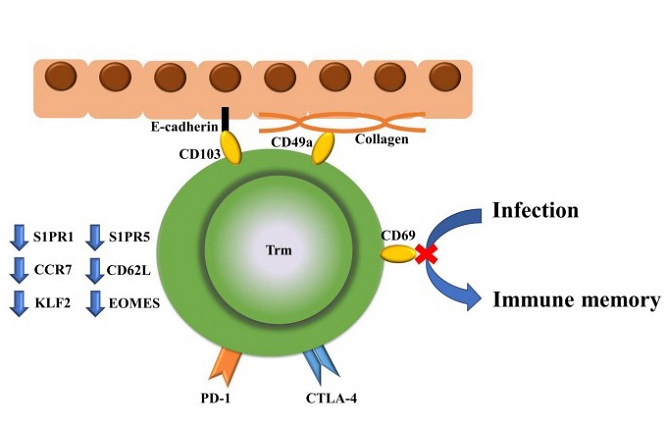Nikhil Prasad Fact checked by:Thailand Medical News Team Jun 19, 2024 1 year, 7 months, 3 weeks, 6 days, 13 hours, 19 minutes ago
Cancer News: Gastrointestinal cancers, which include cancers of the esophagus, stomach, pancreas, liver, and colorectal regions, are among the most prevalent and deadly forms of cancer worldwide. Recent advancements in cancer immunotherapy have introduced tissue-resident memory T cells (Trm cells) as potential game-changers in cancer treatment. This
Cancer News report explores the significance of Trm cells in gastrointestinal cancers, their role in patient outcomes, and the promising future they hold in therapeutic strategies…based on the study findings by researchers from Osaka University Graduate School of Medicine-Japan and Hirotsu Bio Science Inc., Tokyo-Japan.
 Memory T Cells: The New Hope for Treating Gastrointestinal Cancers
Surface markers specific to Trm cells and their functions, and markers that are downregulated are shown. Trm cells play a role in PD-1/CTLA-4-mediated cancer immunity, infection defense, and thereby, immune memory. CD103 and CD49a are associated with E-cadherin and collagen, respectively. Trm cells are characterized by the downregulation of S1PR1, S1PR5, CD62L,CCR7, KLF4, and eomesodermin (EOMES).
What Are Trm Cells?
Memory T Cells: The New Hope for Treating Gastrointestinal Cancers
Surface markers specific to Trm cells and their functions, and markers that are downregulated are shown. Trm cells play a role in PD-1/CTLA-4-mediated cancer immunity, infection defense, and thereby, immune memory. CD103 and CD49a are associated with E-cadherin and collagen, respectively. Trm cells are characterized by the downregulation of S1PR1, S1PR5, CD62L,CCR7, KLF4, and eomesodermin (EOMES).
What Are Trm Cells?
Trm cells are a special type of memory T cell that stay in non-lymphoid tissues, such as the gut or skin, rather than circulating in the blood. These cells act as the body's local guardians, ready to fight off infections and cancers right where they occur. Unlike other T cells, Trm cells do not leave their assigned tissue, making them highly effective at providing immediate immune responses. They are primarily found in the tissues where they first encountered antigens, positioning them perfectly to act quickly against recurring threats.
Trm Cells in Gastrointestinal Cancers
Trm cells have been found in various types of gastrointestinal cancers, including pancreatic and colorectal cancers. Researchers are particularly interested in these cells because they are strategically located in tissues where cancers often develop. This positioning allows Trm cells to detect and respond to cancer cells early, playing a crucial role in immune surveillance. In the complex environment of the gastrointestinal tract, Trm cells interact with cancer cells, providing insights into their spatial distribution and abundance within tumors.
Prognostic Significance of Trm Cells
Studies have shown that the presence of Trm cells in tumor tissues is associated with better patient outcomes. For instance, in pancreatic cancer, patients with higher numbers of Trm cells tend to live longer. Similarly, in colorectal cancer, the presence of activated Trm cells has been linked to improved survival rates. These findings suggest that Trm cells could serve as important markers for predicting how well a patient might respond to treatment. For example, in pancreatic ductal adenocarcinoma, Trm cells co-expressing PD-1 and TIGIT were found to enhance the effectiveness of immune responses, contributing to prolonged
patient survival.
Trm Cells and Immunotherapy
Immunotherapy has revolutionized cancer treatment, and Trm cells are becoming key players in this field. Immune checkpoint inhibitors, such as those targeting PD-1 and CTLA-4, work by boosting the body's immune response against cancer cells. Trm cells, which often express these checkpoint proteins, can be reinvigorated by such therapies to fight cancer more effectively. In colorectal cancer, high levels of CD103+ Trm cells were associated with better responses to PD-1 blockade therapy, highlighting their potential in enhancing the efficacy of current immunotherapies.
Therapeutic Implications
The unique properties of Trm cells offer several therapeutic advantages. For example, combining Trm cell-targeted therapies with traditional treatments like surgery and chemotherapy could enhance overall treatment efficacy. Researchers are also exploring ways to increase the number and activity of Trm cells within tumors to improve patient outcomes further. Adjuvant therapies, such as the use of renin-angiotensin system inhibitors, have shown potential in increasing the abundance of Trm cells in the tumor microenvironment, thereby enhancing their anti-tumor activity.
Challenges and Future Directions
Despite their potential, utilizing Trm cells in cancer therapy comes with challenges. One major issue is understanding how to boost Trm cells' activity without causing adverse side effects. Additionally, more research is needed to determine the best ways to harness these cells in different types of gastrointestinal cancers. However, ongoing studies are promising and suggest that Trm cells could play a pivotal role in future cancer treatments.
Further research is focused on the molecular mechanisms that regulate Trm cell function and survival in tumor tissues. Understanding these mechanisms could lead to the development of new strategies to enhance Trm cell activity and persistence in the tumor microenvironment. Moreover, the integration of Trm-cell-targeted therapies with existing modalities, including immune checkpoint inhibitors and personalized vaccine approaches, offers a promising pathway toward more effective and durable cancer treatments.
Conclusion
Trm cells represent a promising frontier in the fight against gastrointestinal cancers. Their ability to provide rapid, localized immune responses makes them valuable allies in cancer immunotherapy. As research progresses, therapies targeting Trm cells could become standard practice, offering new hope to patients battling these challenging diseases. By leveraging the unique properties of Trm cells, we can move closer to more effective, personalized cancer treatments. The future of cancer therapy lies in understanding and harnessing the power of the body's own immune cells, with Trm cells leading the charge in this new era of medical innovation.
The study findings were published in the peer reviewed journal: Biomedicines.
https://www.mdpi.com/2227-9059/12/6/1342
For the latest
Cancer News, keep on logging to Thailand Medical News.
Read Also:
https://www.thailandmedical.news/news/mitochondrial-respiratory-chain-component-ndufa4-identified-as-potential-therapeutic-target-for-gastrointestinal-cancer
https://www.thailandmedical.news/news/breaking-medical-news-globally-1-in-12-will-develop-gastrointestinal-cancers-and-1-in-16-will-die-from-these-cancers
